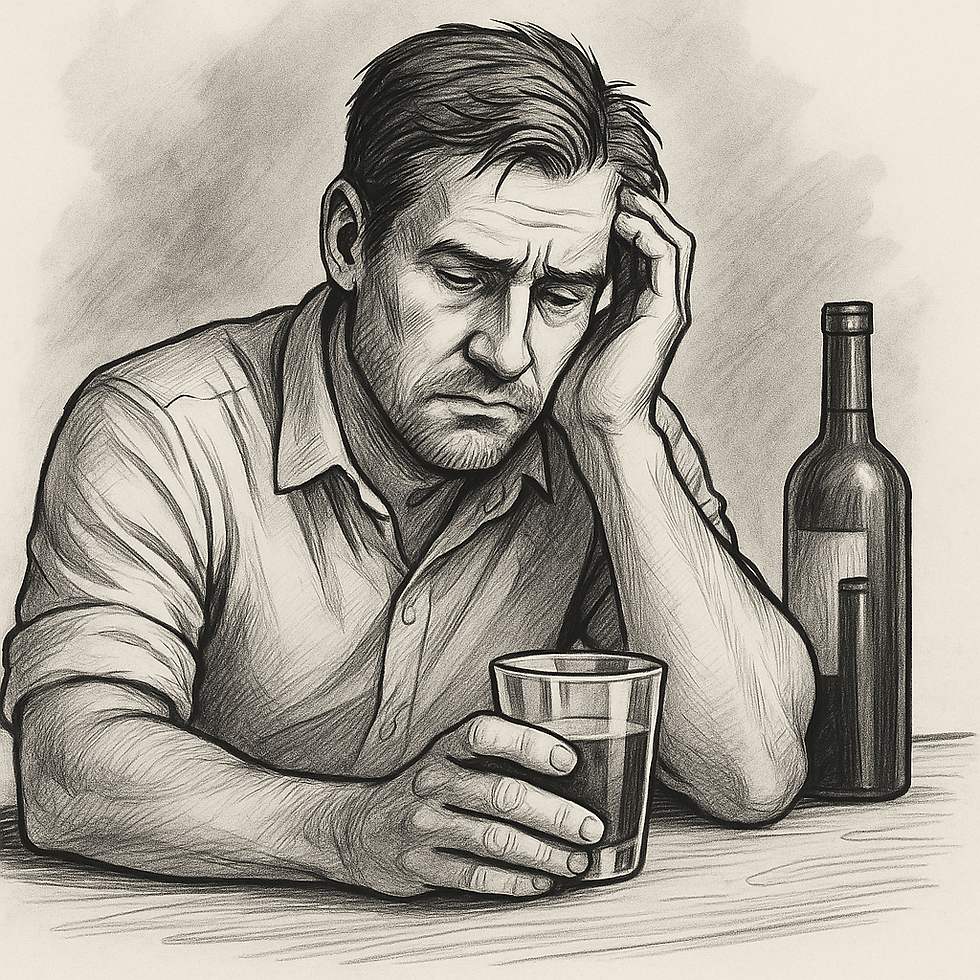Mood, Muscle & Motivation: How Moderate Drinking May Quietly Sabotage Your Performance
- May 15, 2025
- 3 min read
Updated: Dec 15, 2025
By MHI Editorial Team | Medical review: Dr Rui Graça, MD, Urologist & Founder | 15 May 2025
Peter, 46, enjoyed a daily glass of wine - but felt increasingly tired, unmotivated, and stuck with stubborn belly fat.
Could moderate drinking secretly undermine his health?
Discover how small alcohol habits can have significant impacts on mood, muscle, and motivation in men over 35.

Mood, Muscle & Motivation: How Moderate Drinking May Quietly Sabotage Your Performance
Scene 1: “Just One Glass?” - When Normal Habits Start to Backfire
Peter settled into the chair in Dr Rui’s clinic with a sigh.
“Honestly, Doc, I feel off my game. I still hit the gym, but I'm tired, unfocused at work, and this belly fat just won't budge.”
Dr Rui nodded understandingly. “Many men overlook moderate drinking as a cause. Tell me about your alcohol habits.”
Peter shrugged, “Just casual drinking, a glass or two most evenings. Sometimes more on weekends. Normal, right?”
Peter’s experience mirrors a silent epidemic among men aged 35-60. Studies show that moderate drinking, even just one or two daily drinks, can significantly influence mood, energy, body fat, and overall performance.
Scene 2: What the Labs Reveal About Alcohol & Hormones
Dr Rui probed further: “Have you noticed changes in sleep, libido, or stress?”
Peter paused thoughtfully, “Yes, especially sleep, I'm often restless. Stress has increased, too.”
Dr Rui then ordered targeted tests to measure:
Testosterone and Estradiol levels
Sex Hormone Binding Globulin (SHBG)
Liver function
Cortisol levels
HbA1c and insulin resistance
Mini-explainers: - Why these labs? Alcohol activates the enzyme aromatase, converting testosterone into estrogen, causing belly fat storage and low energy. - What is SHBG? It binds testosterone, reducing its availability and negatively impacting mood, motivation, and muscle health.
Your Next Step: From Guessing to Clarity
If your energy, hormones, or performance feel off, blind guessing won’t cut it.
Start by answering 12 simple questions to uncover your most likely imbalance:
(It’s free, confidential, and gives you an instant self-assessment)
Scene 3: Hormone Imbalance Exposed — And a Plan to Fix It
A week later, Dr Rui discussed Peter's results openly:
Testosterone: Low-normal (8.3 nmol/L)
Estradiol: Elevated at 52 pg/mL (optimal <35 pg/mL)
SHBG: Elevated
Cortisol: Slightly elevated
HbA1c: Borderline high at 5.9% (optimal <5.6%)
Dr Rui explained gently, “Peter, even moderate alcohol intake increases your estrogen, lowers free testosterone, and disrupts metabolism. Let's reduce your alcohol intake gradually and integrate some targeted dietary and lifestyle shifts.”
Moderate alcohol raises estrogen and cortisol levels while decreasing testosterone. This hormonal shift encourages visceral fat accumulation, reduces muscle mass, dampens mood, and disrupts sleep quality, ultimately diminishing overall motivation and performance.
Scene 4: Progress, Setback, and the Sleep Puzzle
Eight weeks later, Peter returned, reporting positive changes, but voiced a new concern.
"Initially, I felt fantastic after reducing alcohol. But lately, my sleep quality dipped again."
Dr Rui reassured him, “Your body is recalibrating hormonally. Let's incorporate targeted stress reduction techniques and a structured sleep routine to stabilise things further.”
The Solution Isn’t Abstinence. It’s Awareness
After 12 weeks, Peter's estradiol levels notably decreased from 52 pg/mL to 28 pg/mL. He also shed 5 kg, reported consistently better sleep, renewed energy, and improved mental clarity.
Smiling, Peter said, "Reducing alcohol wasn’t easy at first, but now, I’ve truly reclaimed my health."
Quick Takeaways: - Even moderate drinking affects hormonal balance more than most realise. - Small reductions in alcohol consumption can significantly improve mood, energy, and body composition. - Consistent, guided lifestyle adjustments yield lasting results.
Disclaimer: This article is for educational purposes only and does not constitute medical advice. Consult a licensed physician for personalised care. Clinical details are composite and privacy-protected. Story reviewed by Dr Rui Graça, MD.





Comments